CHANGE OF GUARDS | 16 July 2019
Having had his childhood presidential ambition shaped by Tanzania’s overthrow of the Idi Amin regime, Museveni has always endeavored to win over Tanzania. Mindful of how much Tanzanians value their founding President, Mwalimu Nyerere, Museveni has always pretended to have more love for Nyerere than the Tanzanians themselves. He has been at the forefront of having Nyerere declared a Saint by the Catholic Church. However, when Museveni launched his sectarian war on February 6, 1981, it was a Tanzanian soldier on guard who took the first bullet at Kabamba when now Gen. Tumwine shot him dead in cold blood.
It was another Tanzanian soldier guarding the armory who prevented Museveni’s invaders from accessing the armory. Subsequent deliberate attacks on the Tanzanian soldiers by Museveni’s NRA guerrillas, coupled with Museveni’s repeated pleas to Nyerere to withdraw his troops, saved the NRA from being neutralized at infancy. The new post-Amin army, UNLA, was still too young to neutralize the rebellion led by its former Minister of Defence, Museveni.
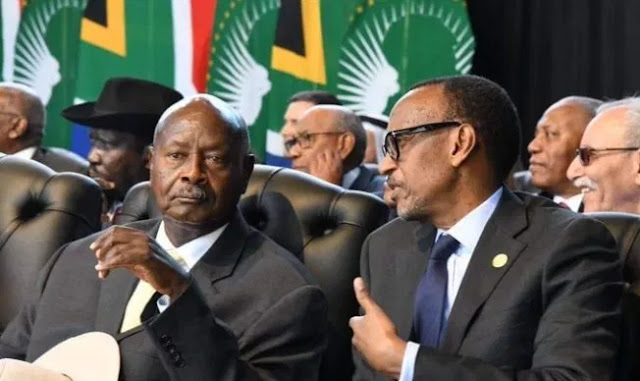
Since Museveni came to power 33 years ago, he has antagonized all his neighbors except Tanzania, for fear of a repeat of what befell the Idi Amin regime. He also considers Tanzania not only his reserve force but an exit route in the event of his reign being challenged by military action. He has also been buying time in the hope that with Tanzania’s backing, he may become the first President of a federated East African Community (EAC). It is in the same regard that his main interest in the EAC is nothing but securing a military alliance.
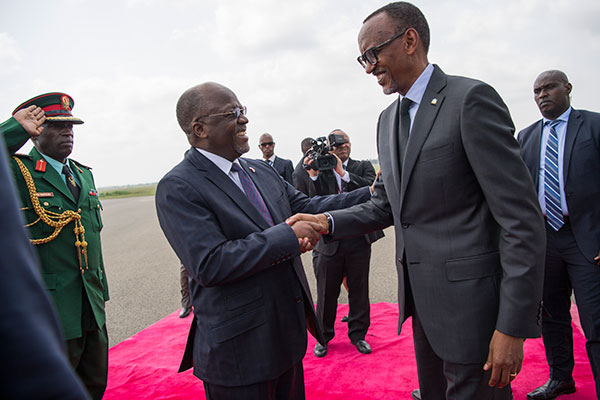
However, he ran out of patience when he plotted to isolate Tanzania by forming the Coalition of the Willing (COWI), which included Kenya, Uganda, and Rwanda. This was after Tanzania deployed its troops to defeat the M23 rebels in eastern DRC before they fled to Uganda. Tanzania stuck to its guns and threatened to ally with Rwanda and DRC. When former President Kikwete was succeeded by President Magufuli, Museveni felt some relief. During an interview with NBS Television at State House in December 2015, Museveni was asked for a comment on the progress of the newly elected Tanzanian President John Pombe Magufuli, whose cost-cutting policies had taken the continent by storm.
Museveni, however, summed up the neighboring colleague’s actions as ‘symbolism.’
“It’s good that Magufuli has got that approach. That is symbolism. I see him doing push-ups to show people that he is strong. I wish him good luck,” said Museveni.
Amidst his bickering with Rwanda’s Kagame over his support for Rwandan dissidents, Magufuli’s first foreign visit to Kigali sent Museveni panicking. Museveni opportunistically abandoned the COWI scheme. He also went ahead to reroute his earlier planned oil pipeline project through Kenya to Tanzania. Since then, he has been on a diplomatic offensive trying to win over Tanzania. He has been pushing for the establishment of a central corridor trade route from Dar es Salaam to Mwanza across Lake Victoria to Kampala for Uganda’s goods.
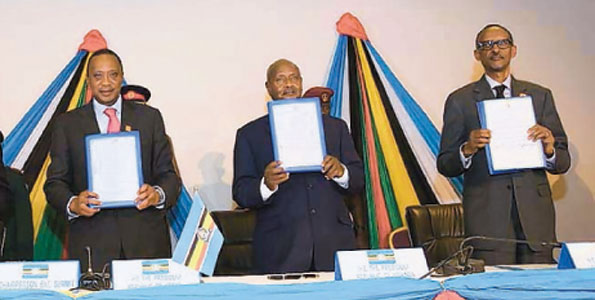
However, Tanzania’s persistent rejection of his smuggled and repackaged sugar and edible oil continues to give him headaches. The various measures that were initiated have not solved the problem as Tanzania continues to adamantly reject the two products. On the other hand, Tanzania’s diplomatic and bilateral relations with Kigali continue to blossom. The anticipated SGR line from Isaka to Kigali that will link Rwanda and DRC to Dar es Salaam Port, coupled with their Rusumo border post that has taken up most of the trade that used to go through Katuna, gives Museveni cause to worry. Kampala has admitted that its exports to Rwanda have fallen by 23%. Consequently, he is hiding desperation behind the Private Sector Foundation Uganda (PSFU), which has petitioned the East African Community Court over the border closure.
However, in the same regard, three years later, in March 2019, while addressing the Africa Now conference in Kampala, he hailed Magufuli’s initiative.
“We need to learn from President Magufuli. He has stopped wastage of money in things such as travel abroad. That’s why you hear that he’s able to build the standard gauge railway without borrowing. He’s now going to build a new dam without borrowing.”
With recent Rwanda’s successes against its Uganda-backed armed dissidents and, more so, its blossoming diplomatic relations with DRC, Museveni feels more vulnerable. Having overrun dissident military camps in South Kivu, Rwandan forces are said to be heading to North Kivu, which borders Uganda. Since the Tanzanian Peacekeeping force under the UN Brigade is active in North Kivu, Museveni needs their cooperation if he is to check Rwanda’s advance.
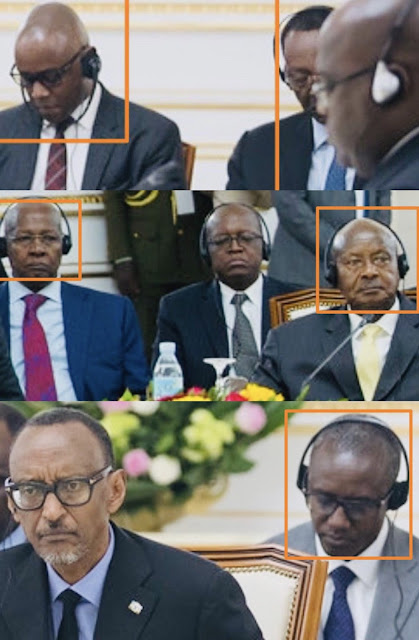
During his recent one-day trip to Angola for the Great Lakes region Quadripartite summit, Museveni realized that both Angola and DRC were in deep alliance with Kigali. He immediately called President Magufuli and requested to make a stopover on his way back. Museveni landed in Mwanza region for a meeting with President Magufuli. In Mwanza, the tribalist Museveni, who strongly feels Tanzania’s Lake Region’s ethnic groups are alien to the rest of the coastal Swahili people, greeted the citizens of Chato in Runyankole:
“Nimumanya Orunyankole? Nimurara muta? [Do you understand Runyankole? How are you?]”
Speaking in Swahili, Museveni told them he had gone to Tanzania to pay pilgrimage. “While Christians go to Rome, Muslims to Mecca, I come to Tanzania as my pilgrimage. It is like a home to me,” Museveni told Magufuli.
On his part, President Magufuli thanked Museveni for the visit.
“We are brothers. President Museveni has a great attachment to this place historically. Our nations also have a long history, most recently when President Nyerere helped Uganda to overthrow Amin’s regime,” said the Tanzanian leader.
President Magufuli also thanked his counterpart for rendering ‘so much’ help to Tanzania from time to time, including most recently when he helped treat Mama Miria Nyerere in Uganda, and also chartering an aircraft for her back home.
The ever-determined and resilient Kigali has reacted by replacing its civilian Ambassador to Tanzania with Gen. Karamba, who has been the Chief Of Staff of the RDF. The appointment is in regard to the militarily strategic diplomatic relations with Tanzania in the face of its ongoing standoff with both Uganda and Burundi. Tanzania is enjoying and reaping big from increased traffic on the Kigali-Rusumo-Dar es Salaam trade route following the closure of the Uganda-Rwanda border. Even if Tanzania does not dance to his tune, Museveni can’t take the oil pipeline back to Kenya. Otherwise, by continuing to defy Museveni’s desperate attempts at manipulation, Tanzania has nothing to lose.
INFORMATION IS POWER AND THE PROBLEM OF UGANDA IS MUSEVENISM

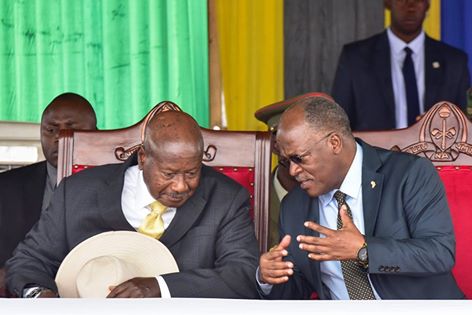





Discussion about this post